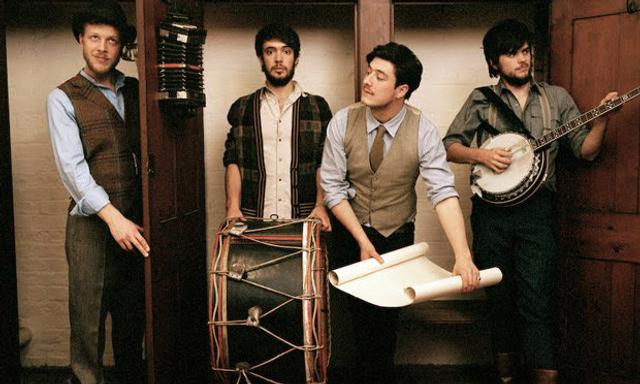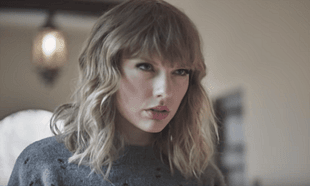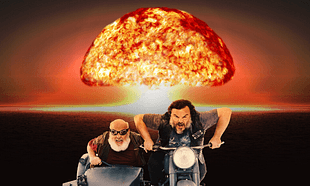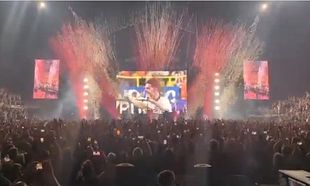Over the course of five years, two albums and a relentless touring schedule, Mumford & Sons have firmly established themselves as one of the premier draws in the UK and Ireland, not to mention further afield. Ahead of their return to Dublin at a sold-out Phoenix Park, keyboardist Ben Lovett and bassist Ted Dwane spoke to us about performing in Ireland, how headlining Glastonbury isn’t always what it’s cracked up to be, and what the future holds for the band.
Ben and Ted, thanks for sitting down with us. How are you today, and Ted, how’s your recovery (from recent brain surgery) going?
TD: Yeah, pretty good.
So you’re back on Irish soil. You seem to have a real affinity for our country, and you’ve always been hugely successful here. What do you attribute that success to?
BL: A mutual love is always a good start, in that we always wanted to come to Ireland. There’s sort of a bond. Ireland’s quite an exotic place if you grew up in London, and when we started touring as a band, the idea of going and playing was something we were really pumped about. I remember our first show, upstairs at Doyle’s, and we were more overexcited about playing at that gig than we would have any other show on that tour. So it started there. That was like the nugget of it because then it’s the keenness to come back, because we’ve toured here a lot.
And even last year, thanks to a well-known Irish drinks company, you played in a small pub here in Dublin, Toner’s. Such intimate shows must be a fairly rare experience for you these days. How was that?
TD: It was nice. I think, relating back to the last question, we’re quite aligned in our appreciation of music. The way we were getting started on our earliest tours was basically pub scenes, which is obviously quite a big thing in Ireland. We really enjoyed that reckless abandon that comes with a few beers and a bit of a singalong so, yeah, getting to do that again was really nice actually, Dublin of all places.
BL: A good reminder. Sometimes all the bells and whistles that have been added over the last few years can be quite distracting.
Speaking of bell and whistles, you headlined Glastonbury just a few weeks ago, having played each one since you became a band. Was the recent show your career pinnacle and if so, where do you go from there?
BL: It wasn’t for me. It was a really great show, I’m glad it was a good gig in a high-profile environment, but I can think of some other great moments. Some of those have been in Ireland. There’s one gig in Poland this year that was a real highlight.
TD: There’s definitely a negative correlation between the higher the profile and the enjoyment of the gig.
Did it feel very business-like at Glastonbury?
TD: No, not at all, but there’s a lot of pressure and there’s all the TV cameras. It’s never going to be a career highlight, you know. It’s going to be a lot of fun, hopefully it’s like any other show, but like Ben says, that gig in Warsaw, our first ever headline show in Poland, was just completely unforgettable.
Big following in Poland?
TD: No! (laughs)
BL: I remember we had such a positive experience the first time we went to Belfast actually when we went to play the John Hewitt pub. We were an hour late for our stage time because our ferry was delayed and that was a real moment that I’ll never forget, even though it was like 80 people. Yeah, it’s hard to know what your checklist is for what makes a great gig.
You’re very much on an upward trajectory, culminating in that headline show at Glastonbury. Ted, I suppose for you that show must have been extra special having made a remarkably swift recovery from your surgery.
TD: Yeah, totally. I mean I grew up near Glastonbury and used to go there a lot. I went there a bunch of times before we ever played there and it was always going to be an epic gig. It was our first gig back after a few weeks off just resting up after the operation. Yeah, it just made it more of a big deal.
As a band, have you managed to come to terms with that fame? You’ve played at the White House, co-headlined with the Rolling Stones, played with Bob Dylan, all these big big names. Do you see yourselves in the same vein as those acts, have you come to terms with the international recognition?
BL: Watching a band like the Killers last night, it’s almost like watching the real deal.
TD: ...watching professionals...
BL: Yeah, watching professionals be a band. It’s totally just four mates who are having a laugh with music but when we watch other outfits it looks like they’re the real deal. I don’t know when you ever feel you’ve become a professional musician.
TD: Not yet, not yet (laughs)
I realise that you’re reluctant to accept that Mumford & Sons emerged from a folk 'scene’. Do you think by now in the public consciousness you’ve transcended that 'scene’?
TD: I don’t know ..... yeah, I don’t know. It’s impossible to tell how you’re perceived. I think it’s important not to think about it too much, because it really means nothing. Some people think we’re a rock band and that’s ridiculous and the idea of us being a folk band - you sit in a pub in Ireland and hear those guys play, and you’re like, 'yeah, we’re definitely not a folk band’.
BL: Do we need to be? Why do we need to be anything really?
TD: It doesn’t really matter, all of us are in to so much different stuff. It’s never going to be one thing. It’s just a mix of a bunch of stuff. You can call it whatever you want really, you know?
That desire to label and tag is a curse of modern music.
TD: Yeah totally, but it’s a really human thing as well. If someone asked me about a band, if I’m trying to describe a band to them, then I use those tags as well.
BL: It’s funny though. I try to do it less. I realised over the last few years how crass it is to be labelled and try harder than labelling another outfit. I try and talk about what they’re singing about or what their melodies are like or how it makes you feel and dig a little bit deeper rather than just 'yeah, pop band, you might like them if you like pop music’.
As multi-instrumentalists, do you feel that your versatility is constrained by your crowd-pleasing formula when you’re on stage, or by your commercial success? Do you feel you’ve been unwillingly pigeonholed and have to subscribe to that?
TD: Not at all. I couldn't imagine being in another band that would give me so much instrumental breadth on the spectrum. We get to move around quite a bit, more so with the newer stuff if anything. It’s good.
Ben, you’ve had a hand in other projects also. You’ve worked with Ellie Goulding a bit. Is there any more of that on the horizon for you?
BL: Um, yeah. There’s some stuff. We all collaborate. I did do one particularly high-profile thing with Ellie on 'Your Song’, but we’re all collaborators. That’s kind of why we formed as a band and I think there’s going to be more coming from each of us. We talk about it and we choose to do it. It keeps us fresh as collaborators for Mumford & Sons. We learn from working with other people and we take stuff away from it. When we come together and try and write what will be our next album, we want to come with new tricks and inspirations and lyrical ideas and melodies.
You’ve described yourselves as a very 'British’ band. But with thematic inspiration taken from Woody Guthrie, John Steinbeck or rootsy Americana in general, is your spiritual home the US?
TD: No, definitely not. Our spiritual home is definitely the UK, but we have such a breadth of influence and America’s a huge part of that, as I think it is for most bands. People of our generation grow up listening to so much of that music whether it’s Dylan and Nirvana or Green Day – all those bands I grew up listening to and all my mates grew up listening to. Inevitably it’s going to affect you musically - it’s your influences. That’s what you grew up listening to so that’s what it’s about. It’s definitely not a spiritual home.
BL: Our physical home, we live in the US now, but our spiritual home will always be the UK.
In many ways, you seem to be 'living the dream’. You’ve become famous and successful in your chosen field. Many 'normal’ people aspire to be where you are, and as members of a band that seems very grounded and populist in how you relate to your audience, do you ever consider that same hypothetical from the other side, what you’d be doing if you did not have that international recognition?
TD: It’s funny, the one thing that I’ve thought about, and I don’t know if it’s actually answering your question, is that I think as human beings we’re eternally unsatisifed. So despite being some of the luckiest young musicians around, you still walk around with an immense sense of dissatisfaction like you just want to do more. The grass is always greener. Potentially we’re very lucky as well because we’re not actually really famous. A lot of people know the band, but we still take the tube every day and don’t get recognised. It’s pretty great. Not a lot’s really changed. We kind of chose to do it that way as well which I’d recommend if anyone wants to be in a band – don’t go on TV if you can help it!
Final question , then. What can we expect from Mumford & Sons over the next year or so? I believe there’s an album in the works.
BL: There’s always been our next album in the works ever since finishing the last record. Everything that we do and everything we listen to and try and write has all been working towards it. We’re going to finish touring this record at the end of September and we’ll take some time out. We’re reluctant to commit to the actual physical beginning of the record. Between the two records, we were so addicted to the road, we just kept on going. We didn’t take more than two months off since the start of the band. We were actually recording in breaks between touring, so it’ll be six years this November that we’ve pretty much been on the road. So it’s some time to go and be real and write songs about life. It’s hard to write songs about life. It’s all kind of incredible.








































































